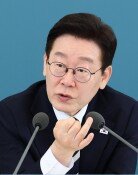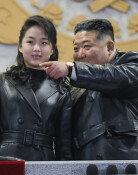Japanese Communist Party Moves Toward Reforms
Japanese Communist Party Moves Toward Reforms
Posted June. 22, 2003 22:00,
The Japanese Communist Party (JCP) has embarked on its reform efforts by amending its platform, which stipulates the ideology and party lines. The first-ever-revision of the party‘s general principles in 42 years shows the party‘s attempts at an ideological shift.
At the June 21 convention, the party`s central committee announced a revised platform, representing a new perspective on basic principles, the nation`s self-defense forces and emperor system, and so on. After consideration within the party, the revised platform will finally be approved at the party convention in November this year.
Changes in the JCP platform
According to a report yesterday in the Asahi Shimbun, the current platform that ‘U.S. imperialism and Japan`s monopolistic capitalism should be destroyed and through socialist revolution, a worker-oriented society should be created’ is replaced by a new one, promoting ‘democratic reform while acknowledging the capitalist regime.’ JCP`s very essence aiming at making socialism and communism realized is maintained, but more realistic lines are added. Some people criticized the JCP`s recent changes as ‘losing its originality’.
Regarding the quasi-military forces, the communist party virtually acknowledged the forces` legitimacy, saying that ‘Article 9 of the current constitution, which forbids possession of military force, should be completely realized’. The revised platform of the party also charged its articulation on the emperor system from the previous stance that the “emperor system should be abolished” to a stance that “acknowledges it as a legitimate system”.
The most ideal government type has changed from a “revolutionary” one to a “democratic coalition regime,” implying a possible coalition with the opposition party.
The past and future
The constitution of the Japanese Party has been corrected four times since it was adopted in 1961, but this time records the most dramatic changes. After the cold war confrontation ended, the party finally decided to change its political lines and ideology to win back its supporters. Nevertheless, with its public image ruined by recent incidents including North Korea`s kidnapping of Japanese citizens, it is forecast that the JCP`s reform initiatives will not pay off.
During elections for Japan‘s upper house in 1998, under a proportional representation system, the JCP garnered a record high 8.2 million votes. In 2001 elections, however, the approval rates went down by half to 4.3 million votes. Party members also have shrunk from 500,000 in 1990 to 400,000 as of now. The number of subscribers to the organ`s paper, Akahata, which once recorded 3 million, is currently 1.8 million. Loss of the party’s external influence is believed to be the major reason for the party‘s recent reform initiatives.
Established in 1922, the Japanese Communist Party has gone through several hardships: During and after the Japan‘s imperialistic activities and the U.S. military occupation, the party teetered on the verge of collapse and engaged in internal disruption over armed struggle policies. Recently, the JCP has served as a counterweight in the nation’s political circle while abandoning the violent revolutionary stance. JCP is led by Fuwa Tetsuzo, Chairperson of the Central Committee and Shii Kazuo, Chairperson of the Executive Committee. The two party leaders have employed appeasement policies since 1997. Along with the recent changes in the party platform, the party has drawn interest over whether Shii, the Chairperson will visit Korea.
Hun-Joo Cho hanscho@donga.com







